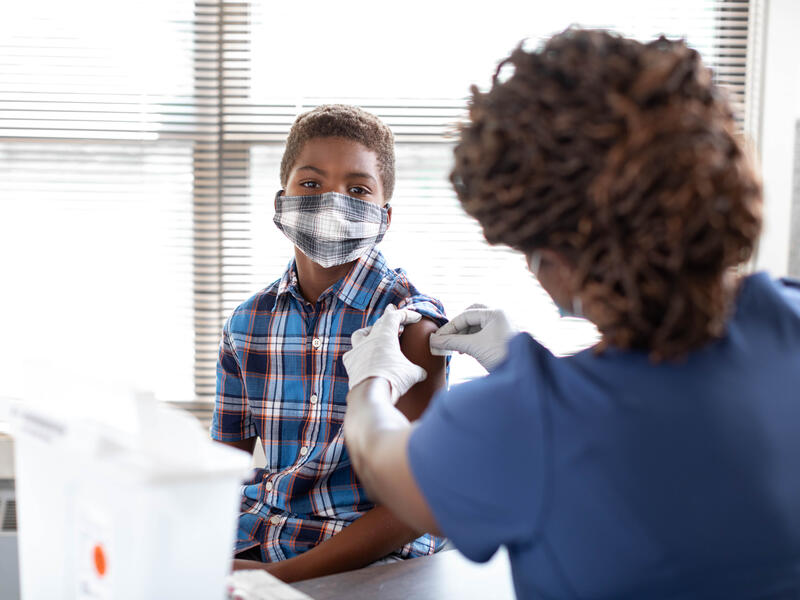Getting animmunizationis never fun, but those few, quick seconds of discomfort are the best ways to protect your body from some truly devastating diseases.
From the mumps and measles to polio and smallpox, vaccines are proven to lower, and in some cases eradicate, the instances of these diseases.
However, in recent years, some parents are choosing to forgo vaccinations due to worries over side effects and long-term complications. Sanford Health pediatricians answer parents’ common questions about vaccinations.
免疫接种是安全的吗?
Yes, saysChristina daSilva, D.O., a pediatrician at theSanford Children’s Campusin Bismarck, North Dakota.
“All immunizations – or vaccines – are fully tested for safety,” Dr. daSilva said. “The approval process used by the Food and Drug Administration (FDA) is rigorous.”
Judit Chavarria, M.D., a pediatrician atSanford Worthingtonin Minnesota, assures parents that while it is 100% their decision whether to vaccinate, the risks associated with immunizations are very minimal.
“Like with any shot, the patient may feel some pain or soreness in the area where the injection was given,” says Dr. Chavarria. “There are a few instances of fever, but beyond that, more serious issues rarely occur.”
How do immunizations work?
Immunizations work by teaching your child’s body how to defend itself from certain diseases, Dr. daSilva explained.
Some immunizations contain a dead or weakened form of a virus or bacteria. Others, like the COVID-19 vaccine, deliver instructions on how to create a protein that triggers an immune response.
Get your COVID/flu vaccine:Find a Sanford Health clinic near you
During an illness, the body develops antibodies designed to fight off that disease. Immunizations teach the immune system how to create those antibodies without your child getting sick.
“Many vaccinations need booster shots to make them the most effective,” Dr. Chavarria said. “Just one dose typically isn’t enough to produce the amount of antibodies needed to develop the best immune response. Depending on the vaccine, you might need one or two as a child and then one later as an adult for optimal immunity.”
What about diseases that are rare in the U.S.? Are immunizations for those still important?
Those diseases are rare because of immunizations, Dr. daSilva said. Immunizations have reduced infections such as polio, whooping cough, diphtheria, measles and rubella.
一些疾病最近又卷土重来。麻疹等疾病在世界其他地方仍很常见。旅行者可能会把这些疾病带回这个国家。如果不进行免疫接种,重新感染的疾病会迅速传播。例如,北达科他州在过去几年里爆发了百日咳。
“With the help of vaccines, we have significantly diminished a number of diseases in the U.S.,” Dr. Chavarria said. “They are rare, but they are still there. Just look at the outbreak at a major American theme park. Hundreds of people contracted the highly contagious measles virus because many weren’t vaccinated.”
In this instance, many of those who became ill chose not to be vaccinated. However, some individuals were unable to receive a vaccination due to age or a compromised immune system.
Do immunizations cause harmful side effects?
“The risk for serious side effects or death from an immunization is so small that it’s difficult to document,” Dr. daSilva said. “In contrast, there is a much higher risk of serious illness from the diseases that immunizations can prevent.”
有些儿童接种疫苗会产生轻微的副作用。这些症状包括低烧、过敏、注射部位疼痛或肿胀。达西尔瓦博士说,严重的反应非常罕见。
“Claims that immunizations cause autism or other diseases have been thoroughly disproven,” she added. “After a careful review, the Institute of Medicine rejected the idea that immunizations have any relationship to autism in 2004.”
我必须给我的孩子接种所有推荐的疫苗吗?
A lot of research went into the Centers for Disease Control and Prevention’s recommended schedule, according to Dr. daSilva. Sticking to the schedule means your child is immunized at the best times to protect them from infectious diseases.
她说:“挑选给孩子接种的疫苗是非常危险的。”“当太多儿童跳过免疫接种时,社区的免疫接种率就会下降。严重的可预防疾病可能会变得更加普遍。”
Dr. Chavarria agrees.
“Not vaccinating your child not only puts them at risk but everyone else they come into contact with,” Dr. Chavarria said. “I just really want to encourage parents to discuss any fears they may have about vaccines with their pediatrician so they can make an informed decision about their child’s health care.”
How can my children get the immunizations they need?
It’s easy, Dr. DaSilva says. Keep regular wellness visits with their pediatrician. Pediatricians make sure children’s immunization status is up to date and provide essential routine health care.
Call your child’s primary care provider to schedule a wellness visit.
Vaccination schedule
According to the CDC, here are the common vaccinations all healthy children should receive, what they protect against and how often they should be administered:
- Hepatitis B (Hep B):between 1 and 2 months, and between 6 and 18 months
- Rotavirus (RV):2 months, 4 months and 6 months
- Diphtheria, Tetanus and Pertussis (DTaP):protects against whooping cough; 2 months, 4 months, 6 months, between 15 and 18 months, between 4 and 6 years old, followed by a booster every 10 years
- Influenza B (Hib):2 months, 4 months, 6 months, and between 12 and 15 months
- Common strains of influenza (Flu):annually starting at 6 months old
- Pneumococcus (PCV):2 months, 4 months, 6 months, and between 12 and 15 months
- Polio (IPV):2 months, 4 months, between 6 and 18 months, and between 4 and 6 years
- Measles, Mumps and Rubella (MMR):between 12 and 15 months, and between 4 and 6 years old
- Chickenpox (Varicella):between 12 and 15 months, and between 4 and 6 years old
- Hepatitis A (Hep A):two-dose series beginning at 12 months, and a second dose given again 6 months later
- Human Papillomavirus (HPV):11-12岁开始服用两次。根据初次接种的年龄,可能需要三剂疫苗。
- Meningococcal disease (MCV4):between 11 and 12 years, and at 16 years
Learn more
- Preparing kids to head back to school
- Well-child checks important for children of all ages
- Protecting your child with vaccines
…
Posted InBack to School,Bismarck,Children's,Family Medicine,Flu,Immunizations,Worthington
